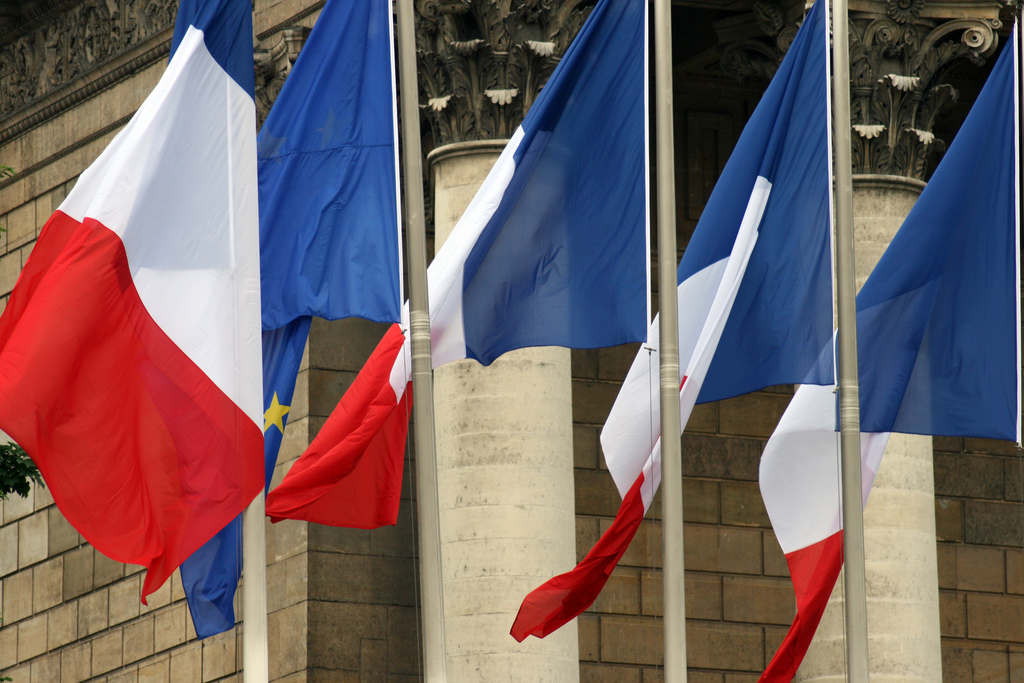In France’s National Elections, Historique pour l’europe
On Sunday, French citizens went to the polls and advanced Emmanuel Macron and Marine Le Pen to the next stage of their presidential election process, eschewing the traditional, mainstream parties that have long dominated French politics. For the first time in French history since the establishment of the Fifth Republic, neither a candidate from an established center left party nor the primary center right party advanced to the final round of the election. It is only the third time a candidate not representing one of those parties has made it to the second round.
The French public’s rejection of the historical mainstream parties is part of a larger global trend of rejecting so-called political insiders and electing far-right candidates, seen in the U.S.’s election of President Donald Trump in 2016 and the Polish election of the Law and Justice Party in 2015. Some reporters called this French election a referendum on Europe, as the European community reels from the blow of the Brexit vote in 2016.
The rise of the far right in Europe has been occurring slowly for the past few years, but the election of President Trump in 2016 re-energized the far-right parties in France. Le Pen, president of the National Front Party, is a strong supporter of Brexit and campaigned on pulling France out of the EU – a so-called “Frexit.” She also has hinted at pulling out of NATO, and stopping all immigration to France; Trump’s travel ban, which was blocked in federal courts, eliminated immigration from only seven countries, for comparison. This is probably unsurprising for a candidate representing a party that has previously engaged in Holocaust denial and is known for xenophobia.
In contrast, Macron is a globalist, a strong supporter of the European Union; his movement to the final round was praised by several European leaders. However, despite his less radical political beliefs, he is also a political outsider – at 39 years old, he has never held elected office. He is a former investment banker and a member of the En Marche! (Forward!) party, a relatively new player in the French political scene. Therefore, even when voters are accepting more traditional policies, they decided to turn to a new party rather than the established parties of the past.
The rejection of the mainstream politics in both France and the United States occurred for a myriad of reasons, mostly rooted in a working or middle class that felt that they had been wronged by globalization, as stated by an anonymous French official to Vox. The outcome was likely also influenced by rising Islamophobia across the Western world, spurred on in France by the deadly shooting of a police officer on the Champs-Elysee on Thursday. The attack was soon claimed by ISIS and prompted Le Pen to call for the expulsion of all those on the French terror watch list immediately.
As the first election held under a state of emergency, French residents were likely influenced by the fear of Islamic terrorism in their country. Part of Le Pen’s policies also include the restriction of public displays of Islamic religion, such as a ban on the hijab. For years, Le Pen and the National Front have asserted that France’s identity is slipping away in favor of a more Muslim society – a belief that many French voters appeared to agree with. Like President Trump, Le Pen has said she would erect border barriers.
While Macron is projected to win on May 7, the popularity of the far-right policies and the support for a party known xenophobic policies and support for the withdrawal could even further alternate the playing field of Western politics in the near future. Additionally, the recent past has shown us that projections are no guarantees. France also remains deeply divided – 84 percent of the vote was spread amongst four candidates, with Macron and Le Pen respectively only getting four percent and two percent more votes that the third and fourth place finishers. The future of the European Union’s efficacy and stability, as well as the future of relations between East and West, will likely be greatly influenced by the outcome of May 7.





